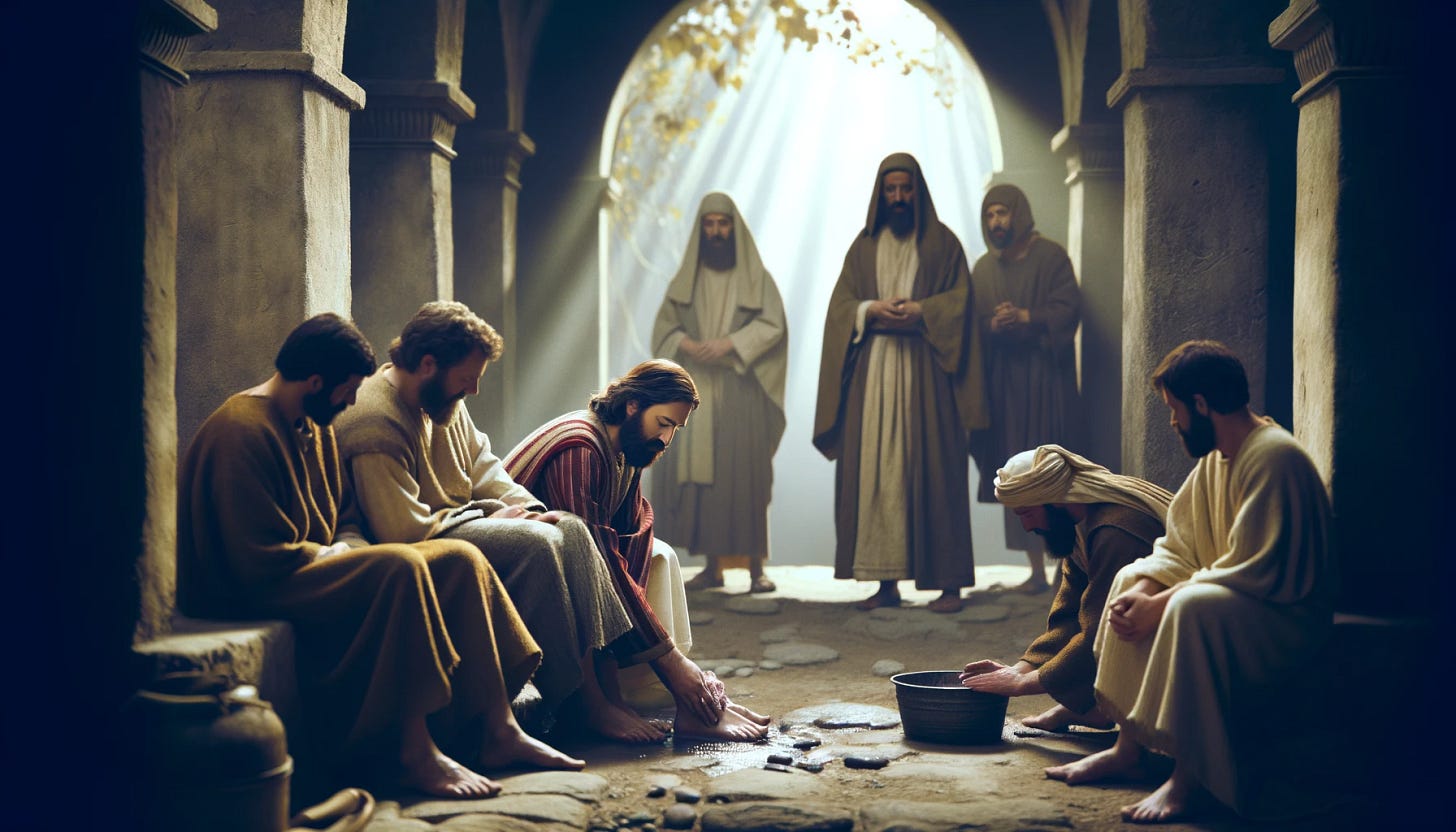Living a Life Set Apart: Exploring the Path to Holiness
Yeshua's Insight: Embracing Holiness as the Heart of Spiritual Transformation
Introduction
Holiness often appears as a lofty, almost unattainable goal in religious texts. Yet, the Torah presents it as a commandment and a practical roadmap accessible to everyone. As we delve into Leviticus 19, we uncover a treasure trove of guidance on how everyday actions can elevate us, shaping a life that mirrors the divine command: "You shall be holy, for I, the LORD your God, am holy." (Leviticus 19:2, 1 Peter 1:16)
The concept of holiness transcends mere moral correctness or ethical purity; it embodies a profound spiritual state, a sanctification of life that touches every aspect of our being. In the swirling currents of daily life, the call to holiness stands as a beacon, guiding us to segregate the sacred from the profane, the eternal from the ephemeral. This divine injunction is not reserved for the ascetic or the hermit, sequestered from the world's bustle. Rather, it is a vibrant, living directive aimed at everyone, regardless of station or calling, inviting each of us to partake in the sanctity of creation.
Yeshua of Nazareth, in His teachings, deepens this concept by emphasizing the purity of the heart: "Blessed are the pure in heart, for they will see God" (Matthew 5:8). This statement invites us to view holiness not just as an external adherence to laws but as an internal state of being. Yeshua calls us to be the "light of the world," a community of people who, like a city on a hill, cannot be hidden (Matthew 5:14). Through this, He teaches that our lives, transformed by holiness, should shine brightly, affecting those around us and reflecting God's glory.
According to the Torah and affirmed by Yeshua, to be holy is to imitate God's nature—transcendent yet immanent in the world. This dual quality of God’s holiness is reflected in our lives: We are called to live in the world but not of it, to elevate our mundane interactions by infusing them with purpose and intentionality. Holiness is not about withdrawing from the world but engaging with it in a way that consecrates every thought, word, and deed.
The teachings of Leviticus 19, further illuminated by Yeshua's insights, provide specific, actionable ways to practice holiness in our daily routines—honoring parents, keeping Sabbaths, and dealing honestly with neighbors. These commandments, far from being abstract ideals, are tangible practices that allow us to experience and manifest holiness in our ordinary lives. Each act of obedience to these laws is a step towards mirroring the divine, transforming our lives into a continuous act of worship and a testament to the sacredness bestowed upon us.
As we explore these ancient texts, let us consider how this sacred call to holiness can transform not only our spiritual lives but also our relationships, our communities, and our understanding of our place in the universe. The pursuit of holiness is a journey of constant striving, where each choice and each moment holds the potential to reflect the divine within us. The lofty, mystical concept of holiness becomes real and attainable in everyday decisions and interactions.
The Definition and Scope of Holiness
What is Holiness?
The Hebrew word for "holy," kadosh, implies being set apart, separated for a higher purpose. This concept is foundational in understanding God's nature and His expectations for us. Holiness is about transcending the ordinary, living in a way that visibly sets us apart from mundane pursuits. It's about aligning our actions with the divine, as God Himself is the epitome of holiness—utterly distinct and infinitely beyond the limitations of our world.
In the teachings of Yeshua of Nazareth, this notion of being set apart is vividly illustrated when he describes his followers as the "light of the world" and a city set on a hill that cannot be hidden (Matthew 5:14). Here, Yeshua emphasizes that holiness is not just a private or hidden attribute, but one that should be evident and impactful, illuminating the darkness around it. This reinforces the idea that our holy living should be visible and influential, actively contributing to the betterment of the world.
How to Achieve Holiness
Achieving holiness is not about withdrawing from the world but engaging with it ethically and intentionally. Every commandment in Leviticus 19 serves as a stepping stone towards living a life that honors God. These are not mere rules but invitations to embody the qualities of the divine within the fabric of daily life.
Yeshua's expository comments on the Torah in Matthew 5-7 demonstrate a deep understanding of the spirit and letter of the law. He emphasizes the importance of both constructively and insightfully. He challenges his listeners to go beyond external compliance to explore the deeper intentions and attitudes that underpin their actions. For instance, he extends the commandment against murder to condemn anger and the law against adultery to include lustful thoughts. This holistic approach emphasizes that true holiness permeates every aspect of one’s being, influencing thoughts, attitudes, and actions.
As Yeshua taught, holiness involves a radical internal transformation that aligns one's heart and mind with the values of the Kingdom of God. It calls for a purity of heart that not only adheres to but exceeds the righteous demands of the Torah. By living out these principles, we embody complete holiness, reaching the core of our being and extending outward to touch every aspect of our lives and interactions with others.
Practical Commandments for Holy Living
Respecting Parents and Elders
"Every one of you shall reverence his mother and his father" (Lev. 19:3). This commandment underscores the value of family and community hierarchy, emphasizing respect and care for those who have paved the way before us. In a society that often venerates youth and newness, this ancient directive calls us to remember and revere the wisdom of age and experience.
Yeshua of Nazareth reaffirms this commandment within his own teachings, underscoring its enduring importance. He explicitly includes honoring one’s parents among the commandments that lead to eternal life (Matthew 19:19). This inclusion confirms the continuing relevance of this Torah commandment and highlights the deep respect for family embedded within the fabric of Jewish law and life. Yeshua's emphasis reinforces the idea that respecting our elders is not merely a cultural tradition but a fundamental aspect of living a holy life.
Sabbath Observance
The Sabbath is a cornerstone of Jewish life, a time set apart each week to rest and renew our spiritual focus. Observing the Sabbath is a declaration that our time does not belong solely to us but is a gift from God, marked by rest and reflection. Rabbi Abraham Joshua Heschel calls the Sabbath “An Oasis in Time,” a term I have affectionately come to embrace.
Yeshua’s teachings on the Sabbath provide profound insights into its purpose and importance. He famously declared, "The Sabbath was made for man, not man for the Sabbath" (Mark 2:27), highlighting that the Sabbath should serve the well-being of individuals, not become a burden. This perspective does not diminish the Sabbath’s sanctity; it emphasizes its role in promoting human flourishing and enhancing our relationship with the Divine. Through Yeshua’s lens, Sabbath observance is seen as a divine provision for our physical and spiritual welfare, reminding us of God's mercy and care for His creation.
Ethics in Daily Interactions
The commandments against stealing, lying, and deceiving speak to the integrity required of us. Leviticus 19:11 commands, "You shall not steal; you shall not deal falsely; you shall not lie to one another." These aren't just ethical guidelines; they are foundational principles that govern holy living, ensuring that our interactions build trust and community, not erode them.
Yeshua intensifies the call for integrity in our interactions through His teaching, "Let your 'Yes' be 'Yes,' and your 'No,' 'No,'" (Matthew 5:37). This instruction not only upholds the Torah’s demand for honesty but also elevates it, teaching that our words should be so filled with integrity that further oaths or confirmations are unnecessary. This reflects a deep commitment to truthfulness, where the simple honesty of one's word reflects inner holiness and reliability. By embodying this principle, our daily interactions testify to our fidelity to God’s laws and our dedication to living out His truth in every aspect of life.
Through these teachings, Yeshua affirms the Torah's instructions and deepens their application, inviting us to a deeper engagement with the divine will. His emphasis on practicing these commandments within a framework of love and respect for others highlights the holistic nature of Torah observance as a means to foster both personal holiness and communal well-being.
Holiness in Interpersonal Relationships
Love Your Neighbor as Yourself
This famed dictum from Leviticus 19:18 is echoed across religious texts but originates here in the Torah. It calls us to empathy, to consider the feelings and experiences of others as deeply as we consider our own. It's a directive that challenges us daily: to extend kindness, justice, and mercy to everyone we encounter, regardless of our personal feelings.
Yeshua of Nazareth not only reaffirms this commandment but places it at the heart of his teachings, declaring it second only to the commandment to love God (Mark 12:31). This prioritization underscores the inseparable link between our love for God and our love for our fellow human beings. Yeshua’s emphasis on this commandment as central to religious life radically shifts the focus from merely following ritual laws to actively engaging in acts of love and kindness to express one's faith.
Throughout His ministry, Yeshua exemplified this command through His actions. He interacted with those marginalized by society, such as the Samaritan woman at the well, tax collectors like Zacchaeus, and even those deemed sinners whom others would typically shun. His approach was not just about teaching love but demonstrating it in practical, tangible ways that often broke societal norms. This approach challenges us to reconsider how we implement this command in our lives, urging us to extend love beyond comfortable or socially acceptable boundaries.
Yeshua’s teaching on the Good Samaritan further deepens this command, illustrating that our 'neighbor' includes even those we might consider outsiders or enemies. The parable illustrates that loving our neighbor requires personal sacrifice and compassion. This story invites us to a higher standard of love, where our actions speak as loudly as our faith.
In light of Yeshua's life and teachings, loving our neighbor becomes a moral obligation, a form of worship, and a way to honor God through our relationships with others. It invites a more profound reflection on our daily interactions and challenges us to live out this command in every encounter.
By integrating Yeshua's examples and teachings into our understanding of "Love your neighbor as yourself," we see this commandment not as a lofty ideal but as a daily, lived reality. It becomes a practical guide to building a community rooted in mutual respect, compassion, and holiness, where every action and interaction is infused with divine love.
Holiness and Community Leadership
Role of Leaders in Promoting Holiness
Leaders in any community bear the unique responsibility of modeling holiness. They set standards not only through rules but also through their behavior. Leaders are called to be exemplars, living out the commandments they teach and fostering an environment where holiness can thrive.
Yeshua of Nazareth's model of servant leadership profoundly illustrates this role. In a memorable act of humility and service, He washed His disciples' feet, teaching them that "no servant is greater than his master, nor is a messenger greater than the one who sent him" (John 13:14-15). This act demonstrated the importance of humility and service and redefined the concept of leadership. Yeshua showed that true leadership in promoting holiness involves serving others, not wielding power over them. This servant leadership model is crucial for leaders who wish to cultivate a community of holiness; they must lead by example, showing that true holiness involves humility, self-sacrifice, and the prioritization of others' needs.
Building a Holy Community
A holy community is one where members actively work towards the common good, supporting one another in pursuing a sanctified life. It is a community where God’s laws are not burdensome but are seen as divine gifts that guide toward greater fulfillment and joy.
Yeshua’s teachings, particularly the parables of the Kingdom found in Matthew 13, provide rich illustrations of how communities can grow and be shaped by God’s principles. These parables, which include the stories of the mustard seed and the yeast, show that a community rooted in the principles of the Kingdom of God starts small and may seem insignificant at first but grows in ways that far exceed its humble beginnings. This growth is organic and intertwined with the everyday lives of its members, suggesting that the Kingdom of God is built through small, often unnoticed acts of love, justice, and mercy.
Moreover, Yeshua emphasizes that such a community's growth involves celebration and challenge. The parable of the wheat and the weeds (Matthew 13:24-30) teaches that a holy community will face challenges from within and without, yet the ultimate harvest is assured if the community remains faithful to God's precepts. This parable encourages leaders to be patient and steadfast, fostering growth and addressing issues without losing hope or faith in the transformative power of God’s word.
In sum, Yeshua’s teachings not only reaffirm the Torah’s guidance on community and leadership but expand upon it by offering a vision of how communities can thrive spiritually when led by principles of servant leadership and commitment to the Kingdom of God. Leaders who embrace this model can transform their communities into vibrant examples of holiness, marked by growth, resilience, and the active pursuit of God's justice and mercy.
Conclusion
The path to holiness is marked by daily decisions and actions. It is about choosing, again and again, to set ourselves apart by living lives that reflect our sacred commitments. (See my talk on Divine Time and the importance of “Now”) As we reflect on these teachings from Leviticus, supplemented by the profound insights of Yeshua of Nazareth, let us consider how these ancient truths can transform our modern lives, infusing every moment with the essence of holiness.
Yeshua emphasized a deeper, more intensive adherence to the Torah. He called his followers to observe the law and internalize its principles deeply—seeking God's righteousness as a way of life. "Seek first the kingdom of God and his righteousness, and all these things will be added to you" (Matthew 6:33). This directive aligns closely with the continuous journey toward holiness, urging us to prioritize spiritual growth and divine alignment in all aspects of life.
As Yeshua taught, embracing holiness involves an earnest striving for the Kingdom of God—a realm where God's ways and laws govern our hearts and actions. This pursuit is not passive; it requires active and persistent engagement with the teachings of the Torah, as illuminated by Yeshua's life and words. It is a journey of constant striving, where each choice and each moment holds the potential to reflect the divine within us.
As we endeavor to live out these teachings, let us be inspired by Yeshua's model of perfect obedience to the Torah, which he lived out not as a burden but as a joyful affirmation of his relationship with the Father. His life is the ultimate example of holiness in action—compassionate, just, and fully aligned with God’s will.
I invite you to join the discussion below. How do these interpretations of holiness challenge or reinforce your understanding? Are there aspects of your life where you feel called to a higher purpose or a greater demonstration of holiness? Share your thoughts, and let us learn from each other as we walk this path of sanctity together.
Your insights and experiences are invaluable as a testament to your personal journey and as beacons for others who strive to live out their faith in tangible, impactful ways. Together, let's explore the profound and beautiful ways we can bring the essence of holiness into every moment of our lives, guided by the Torah and the life of Yeshua and his teachings.
Have a great day! Stay sharp. Pray. Be ready.
Ty
'Jesus is Jewish,' a guiding light for those seeking to understand the Galilean who truly transformed the world. This book is not just a historical exploration; it is an invitation to rediscover Jesus' identity through the lens of his rich Jewish heritage. Let this New Year be a time of profound and enlightening discovery. Begin your transformative exploration by clicking the image below.








Thank you Ty, for stimulating our prefrontal cortex. I see the beginning of your 2nd book on "101". Consecration “the separation of oneself from things that are unclean, especially anything that would contaminate one’s relationship with a perfect God.” Consecration also carries the connotation of sanctification, holiness, or purity. I used to have a different set of thinking prior to meeting you. My "bail out" was the concept of "pre-tribulation". (With a paradigm shift ! !), We now continue to be closer to Him by being Holy and pray for "safety" for the "righteous"